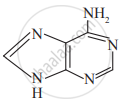Advertisements
Advertisements
प्रश्न
Draw a neat diagram for the following:
One purine base from nucleic acid
उत्तर
Adenine A:

Guanine G:

APPEARS IN
संबंधित प्रश्न
Give scientific reasons:
On complete hydrolysis DNA gives equimolar quantities of adenine and thymine.
The following statement applies to DNA only, some to RNA only, and some to both. Label them accordingly.
The polynucleotide is double stranded. (_______)
The following statement applies to DNA only, some to RNA only, and some to both. Label them accordingly.
The polynucleotide contains guanine. (_______)
Write the sequence of the complementary strand for the following segment of a DNA molecule.
5' - CGTTTAAG - 3'
Write the sequence of the complementary strand for the following segment of a DNA molecule.
5' - CCGGTTAATACGGC - 3'
The sugar component of nucleotide unit in RNA is _________________
In which of the following structure of DNA carries genetic information of the organism?
Sugar present in DNA is ___________
Draw structure of following.
Cytosine
An example of feedback inhibition is ______.
Pentose sugar present in RNA is ______
The correct statement regarding RNA and DNA respectively is ____________.
The pyrimidine bases present in DNA are ____________.
If one strand of the DNA has the sequence ‘ATGCTTGA’, then the sequence of complementary strand would be ____________.
What type of linkages holds together monomers of DNA?
Give any three differences between DNA and RNA.
Write a note on the formation of α-helix.
Which of the following are substituted purines?
Draw a neat diagram for the following:
AMP
Which one of the following pairs of nitrogenous bases of nucleic acids, is wrongly matched with the category against it?
Watson and Crick (1953) proposed DNA double helix model and won the Nobel Prize; their model of DNA was based on:
- X-ray diffraction studies of DNA were done by Wilkins and Franklin.
- Chargaff’s base equivalence rule
- Griffith's transformation experiment
- Meselson and Stahl's experiment
Which of the following are correct combination of purine bases?
What are the nucleotides?
